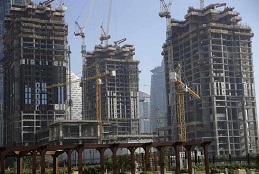Construction sector is labour intensive, and Telangana, which has been seeing a steady growth across real estate segments and infrastructure sector has been employing a significant portion of migrant labour for construction works, which almost accounts to over 90 per cent. With migrant labour shifting to their native places due to the lockdown, construction activity is likely to be severe hit, say industry experts.
Explaining the current scenario, P Ramakrishna Rao, president, Credai Hyderabad, told Telangana Today, “The construction sites will be locked up as there will be no labour available, as the dependency on migrant labour in real estate is almost about 95-98 per cent. The real estate developers will be in deep crisis and projects will be stalled due to lack of labour, till they return.”
Echoing the concern, G Ram Reddy, chairman, Credai Telangana, said, “Since majority of the labour employed in real estate in Telangana are migrant, we wouldn’t be able to resume works at our sites. Real estate roughly employs six lakh migrant labour. At least for one month, we wouldn’t be able to carry out construction, without the workers. Huge investments have gone into the projects and commitments are made to several stakeholders. This will create trouble.”
Mahesh Anand, president, Indian Paint Association said, “While paints industry is witnessing a loss of business for about 35 days, manufacturing can resume now, barring the plants that are in the containment zones. No job losses in the formal sector have happened in the industry so far. But in the informal sector, painters, who are in large numbers, are going to be affected. There will be a huge hit. For new construction projects, since there is high dependence on migrant labour, and as they are going to their native places, work could be impacted severely.”
Investment climate
When asked about the buyer/investor sentiment, Rao said that affordability has been the biggest attraction for Hyderabad residential sector. Buyers can buy homes in the range of Rs 4,000-7,000 per sq ft, which is not the case with many top cities. Since the interest rates have gone down by about 0.5 per cent, the asset class is going to attract many investors.
Not only the city’s residential sector, office space too remains attractive for any multinational that is looking to establish its footprint in India, with Hyderabad going to be the first choice.
“Unlike many other cities in the country, Hyderabad is an end-user market. End-users are always driven by the desire to buy a home. Due to the Covid-19 scenario, these prospective buyers may defer their buying decision by a few weeks. But largely everyone has realised during the lockdown that they should have their own shelter/house, as certain tenants faced certain issues,” Rao noted.
According to Rakesh Reddy, director, Aparna Constructions and Estates, sentiment towards real estate will be positive in the coming months. Hyderabad has remained a favourite destination for investors, and unlike other cities, the city will not be impacted adversely.
Commercial real estate services and investment firm CBRE in its latest report has listed Hyderabad among the top four cities in India that led real estate investments in the year 2019, competing against Mumbai, National Capital Region and Bengaluru. The city is likely to maintain its growth momentum this year as well.
Ram Reddy added, “Real estate remains a safe investment. We will bounce back. Telangana has been buoyant, and hopefully good days are going to be back.”
Homebuying sentiment
Anuj Puri, chairman, Anarock Property Consultants, said, Hyderabad, Bengaluru and Mumbai were the most preferred cities for buyers who had already booked properties either just before the coronavirus-induced lockdown or during it.
“The security of owning a physical asset during a coronavirus-like crisis now combines with a rising aversion to high-risk investments. As a result, the demand for residential real estate has increased. The general homebuying sentiment is also guided by cheaper home loan interest rates, which currently averages between 7.15 per cent and 7.8 per cent,” added Puri.
Ramakrishna Rao said, “If Telangana government can consider to reduce registration tax for next six months or so, or provide a rebate of 30-35 per cent in the registration charges for ‘early bird’ investors who will come forward to buy properties in the next two months, this will attract more buyers and this will also bring income to the government (on an average registration income used to fetch the government about Rs 25-30 crore daily during normal times). Such moves will help kick-start the momentum in the sector.”
Raw material constraints
Saying that there are two issues faced by the sector, Rao mentioned, supply of natural sand and cement are posing certain challenges. There are certain logistics challenges with the supply of sand, and Telangana government is actively helping resolve the issue in a couple of days.
“The major issue remains that of the cement prices jacked up by cement manufacturers. We were buying cement in the range of Rs 230-240 per bag, which has increased to Rs 400 per bag. No way, developers can buy at this rate. Without cement, nothing moves in a project site. It is the core ingredient for constriction. We have approached the State government to intervene and see that the cement manufacturers do not cartelise at this crisis time. Real estate remains the second largest job creator and all the stakeholders should work together,” Rao added.


Comments are closed.